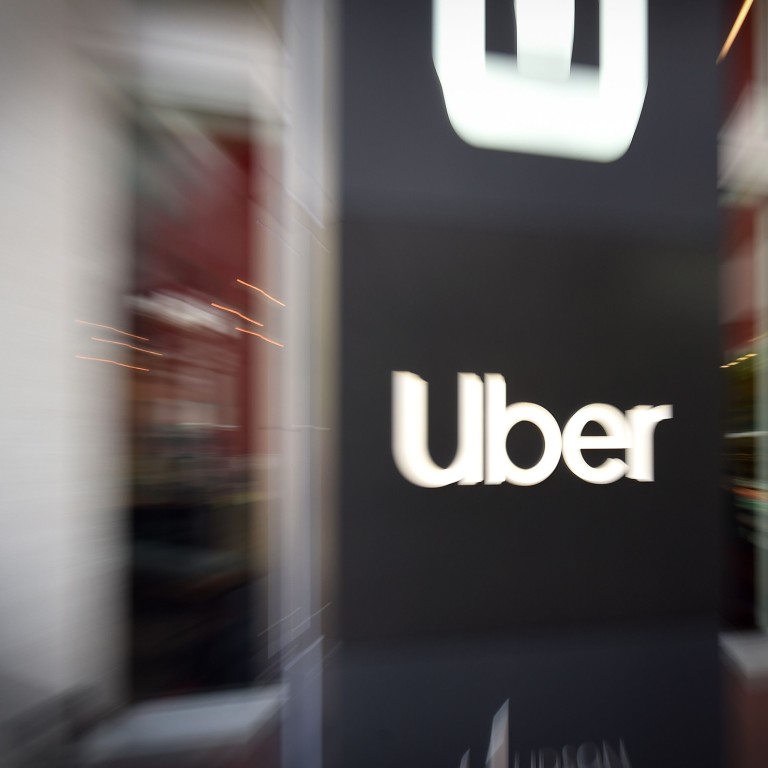
Ride hailing giant Uber raises US$8.1 billion in US IPO priced near bottom of range in bumpy week for markets
- Even at the low end of the price range, Uber’s listing is set to be among the 10 largest US IPOs of all time
Uber Technologies raised US$8.1 billion in its initial public offering after pricing shares near the bottom of their marketed range.
The ride-hailing company sold 180 million shares for US$45 each, according to a statement on Thursday. It had marketed them for US$44 to US$50 apiece.
Based on the amount of stock outstanding after the offering, the IPO price gives San Francisco-based Uber a market value of US$75.5 billion, just below its last private market value of US$76 billion. The fully diluted value, including restricted stock units and other shares, could be about US$82 billion.
Uber has prioritised selecting shareholders – particularly institutional investors – that it thinks will hold on to the stock for a long time, according to a person familiar with the matter. The company is hoping to avoid the tumultuous first weeks of trading in rival Lyft, whose shares fell below its US$72 IPO price within days of listing and closed 23 per cent below that price Thursday.
“We view Uber’s conservative pricing as a smart and prudent strategy coming out of the box as it clearly learned from its ‘little brother’ Lyft, and the experience it has gone through over the past month,” Wedbush Securities analyst Dan Ives said. Uber’s biggest competitor briefly dipped below its last private value of US$15.1 billion in premarket trading Thursday, before rebounding to close at US$55.18 for a valuation of about US$15.8 billion.
Even at the low end of the price range, Uber’s listing is set to be among the 10 largest US IPOs of all time and the biggest on a US exchange since Alibaba Group Holding Ltd.’s US$25 billion global record holder in 2014, according to data compiled by Bloomberg.
Still, it’s a considerable climb down from earlier projections: Last year, bankers jockeying to lead the offering told Uber it could be valued at as much as US$120 billion in an IPO.
That is partly because, after waiting a decade to go public, the most highly valued start-up in the US is set to make its market debut amid less-than-ideal conditions. US stocks fell for a fourth day Thursday, leaving the S&P 500 index on pace for its worst week of the year as trade tensions escalated between the US and China. Uber shares are due to begin trading on the New York Stock Exchange Friday, under the ticker UBER.
This year, widely expected to be the busiest for mega US tech listings this century, started with a partial government shutdown that closed the agency that approves IPO documents for 35 days, all but killing activity in the first quarter. After submitting its confidential filing in December, Uber – along with Lyft and a host of other hopefuls – was left sitting on the sidelines while US stocks enjoyed the best start to a year in at least a decade.
The pricing – and subsequent trading performance – will be closely watched by the cavalcade of other tech start-ups that are expected to go public this year, including Slack Technologies Inc., Postmates Inc., Peloton Interactive Inc. and Airbnb Inc.
Uber’s executives and advisers settled on a final IPO price after spending the past couple of weeks pitching to potential investors at roadshow events in cities including New York, London and San Francisco. Picking the right number helps ensure that the stock has a stable start to trading: The price goes up, but not enough to worry investors into thinking that more money should have been raised.
On the roadshow, Uber touted its plans to expand in logistics and other transport businesses, including scooters, autonomous driving and mass transit, a person familiar with the matter has said. The company aims to become a one-stop shop for customers who would only need to use one platform for multiple services.
Arun Sundararajan, a professor at New York University’s business school, said that while going public will give Uber money to capture more of the transport market, it could also push it to put quarterly targets ahead of its broader ambitions.
“The trillion dollar valuation will come if they can spend the next five to 10 years getting to that place where more is spent on Uber than on any other form of transport,” Sundararajan said. “The trouble is that is going to require keeping investors at bay who are putting pressure on Uber to deliver earnings.”
“The freedom to play the long game gets significantly reduced when you go public even when the resources to do so are increased,” he said.
Like many of the IPO class of 2019, Uber is deeply unprofitable. It lost $3.04 billion last year on an operating basis on revenue of $11.3 billion, bringing total operating losses over the past three years to more than $10 billion, according to filings.
Uber has been working with Morgan Stanley to lead its IPO plans, alongside Goldman Sachs Inc. – once the company’s go-to bank – and Bank of America Corp. as part of a roster of 29 banks in total that were listed in its prospectus as advising on the offering.

